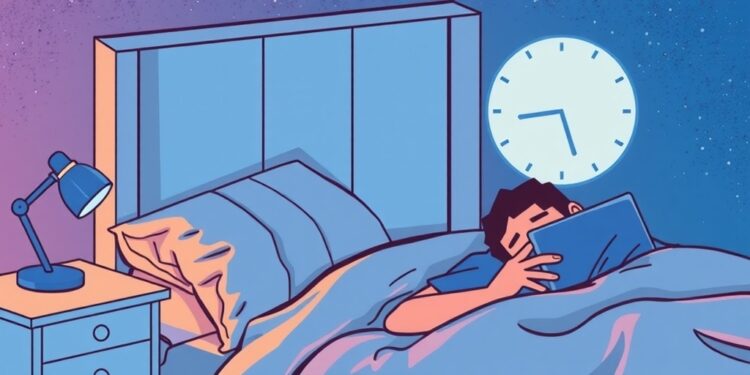In an era driven by technological advancement, the manner in which we engage with screens has become an intricate aspect of our daily lives. A significant concern arises from a recent investigation involving the sleep patterns of young adults in Norway, where the ramifications of screen usage in the bedroom have become glaringly evident. Data gathered from over 45,000 participants illuminated a stark correlation between extended screen time in bed and heightened instances of insomnia, as well as decreased sleep duration. What stands out is that social media, often blamed for engaging sleeplessness, does not uniquely contribute to these sleep disturbances as compared to other screen-related activities.
The research, spearheaded by Dr. Gunnhild Johnsen Hjetland from the Norwegian Institute of Public Health, indicates that the quality of sleep may be jeopardized simply by engaging with screens in bed, irrespective of the specific activity. This critical finding promotes a broader understanding that the total screen exposure time effectively inhibits restful sleep rather than pinpointing individual online behavior as a primary cause. Dr. Hjetland underscores that the research’s objective was to establish the nuanced relationship between varied screen activities and sleep metrics, especially considering the interactive nature of social media and its potential emotional toll.
What becomes apparent is the growing prevalence of sleep disorders among students, with far-reaching implications that extend into mental health, academic achievements, and overall life satisfaction. In recognition of these concerns, the backdrop of the study is set against daily life routines where students are increasingly turning to screens as bedtime companions, overshadowing the fundamental need for restorative sleep. The average person often finds themselves caught in a relentless cycle of late-night scrolling or binge-watching, inadvertently surrendering vital time meant for recuperation.
In dissecting the methods utilized within the study, researchers employed the comprehensive 2022 Students’ Health and Wellbeing survey, which is noteworthy for its national representation of Norwegian students. This sizable cohort consisted of participants between the ages of 18 and 28 who were involved in full-time higher education. Ensuing inquiries invited participants to reveal whether they indulged in screen usage after bedtime. They meticulously articulated the duration and choice of screen activities, which ranged from watching movies, gaming, and browsing social media, to more passive forms like listening to podcasts or engaging with academic materials.
The findings revealed alarming insights on how even a slight increase, quantified as one additional hour of screen time post-bedtime, escalated the likelihood of experiencing insomnia symptoms by an astonishing 59%. Concurrently, sleep durations diminished by an average of 24 minutes. Surprisingly, the nature of the activity—whether it was social media engagement or gaming—did not substantially alter these outcomes. Rather, the overarching consensus was a clear indication that screens, in any capacity, were primarily responsible for sleep deprivation through the mechanism of time displacement.
This intriguing revelation prompts us to reflect on the broader implications of screen usage; fundamentally, they act as agents that postpone our transition into a state of sleep. It displaces the time we would otherwise allocate for unwinding and preparing for rest, thereby perpetuating a cycle of wakefulness. With diverse activities affecting our interactions with screens, it raises questions about personal choices and the responsibility that comes with them, especially when it comes to optimizing our sleep hygiene.
Furthermore, the allure of screens can be a double-edged sword, drawing in users with compelling content while simultaneously sabotaging the necessary conditions for slumber. The phenomena of notifications disrupting restorative phases of sleep, the replacement of sleep time with engaging screen activities, the mental engagement that makes falling asleep more tedious, and the harsh light emitted from screens that disrupts our natural circadian rhythms each contribute to the overall problematic picture painted by excessive screen time.
Dr. Hjetland provides practical recommendations for individuals struggling with sleep disturbances to potentially mitigate these issues. A suggested approach includes significantly decreasing screen usage before sleep, ideally recommending a cessation period of at least 30 to 60 minutes prior to settling down for the night. The notion of minimizing interruptions through disabling notifications also emerges as a notable tactic to enhance sleep quality.
Despite the compelling results exhibited in the study, researchers caution that the conclusions drawn stem from a singular cultural context. Variations in behaviors and attitudes towards screen time across different global populations may yield significantly distinct results. Moreover, a lack of individual activity segregation, such as defining the distinct impacts of music listening versus gaming, along with the study’s observational nature, leaves room for future research. The study was inherently limited in its ability to ascertain causality, asking whether insomniac tendencies prompt increased screen use or if the vice-versa holds true.
To conclude, as we continue to unearth the effects of our digital habits on essential aspects of wellbeing, the spotlight remains on the chance to reclaim our sleep in a hyper-connected world. The findings compel a reevaluation of not only personal practices but societal norms surrounding resting and relaxation. A greater emphasis on responsible screen use could potentially foster better sleep for this generation of students, promoting healthier lifestyles on an individual and communal scale.
Subject of Research: People
Article Title: How and when screens are used: Comparing different screen activities and sleep in Norwegian university students
News Publication Date: 31-Mar-2025
Web References: 10.3389/fpsyt.2025.1548273
References: Frontiers in Psychiatry
Image Credits: N/A
Keywords: Sleep, insomnia, screen time, social media, mental health, wellbeing, circadian rhythms, students.




